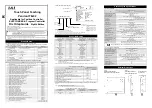
quent assembly of the socket).
Then proceed with assembly of the
BLACK
“L” type socket on
the end of the power cable, as follows:
01.
Insert the various elements of the socket on the cable, tak-
ing care to observe the sequence as shown in
fig. 7
;
CAUTION!
– Do not modify the electric jumper on the connec-
tor (fig. 8).
02.
Using a slotted screwdriver, attach the
blue wire to termi-
nal n° 1
on the connector and the
brown wire to the earth-
ing terminal
(
4
) (
fig. 9
):
Note
– The reference numbers and symbols are printed on
the connector below the terminals and on the opposite side.
03.
After fixing the two wires, insert the connector in its casing
(
fig. 10
).
Important –
The correct position of the connector is
that with the earthing symbol in the lower position (see
fig. 10)
;
04.
Then pull the cable outwards from the socket and insert the
seal and washer (
fig. 11-a-b
). Lastly, tighten the cable
clamp (
fig. 11-c)
using a wrench, to guarantee a complete-
ly sealed closure.
05.
After assembling the socket, position the seal supplied on
the connection side (
fig. 12
).
STEP 8 –
Connecting the photovoltaic panel to the battery
To connect the panel to the battery, proceed as follows:
01.
Connect the
GREY
“L” type socket to the “
IN”
connector
on the battery (
fig
.
14
);
02.
To select the most suitable connection configuration for the
connection of all system devices, refer to the example
shown in
fig. 15
.
Note
– If frequent disconnection of the
battery plug is envisaged, use the screw in
fig. 16-a
. Other-
wise use the screw in
fig. 16-b
.
STEP 9 –
Connecting the battery to the automation
To connect the battery to the automation, proceed as follows:
01.
Connect the
BLACK
“L” type socket to the “
OUT”
connec-
tor on the battery (
fig. 17
);
02.
To select the most suitable connection configuration for the
connection of all system devices, refer to the example
shown in
fig. 18
.
Note
– If frequent disconnection of the
battery plug is envisaged, use the screw in
fig. 16-a
. Other-
wise use the screw in
fig. 16-b
.
03. CAUTION! – For safety reasons, the operations de-
scribed in
point 03
must be performed exclusively
by a skilled and qualified technician.
Access the control unit of the automation and insert the
power cable connector in the buffer battery socket on the
control unit.
To locate this socket, refer to the instruction
manual of the automation to be powered.
––– General note –––
IMPORTANT
– After connecting the product to the automation,
the system may not be operative immediately; this depends on
the fact that the battery may be discharged due to the natural
process of discharging over time, even when stored. In this case,
there are two ways to proceed:
A)
Disconnect the battery from the automation control unit and
wait for a few days for the photovoltaic panel to receive sufficient
sunlight in order to recharge the battery;
B)
Proceed with rapid recharge of battery using back-up power
supply unit mod. MBC (optional accessory).
4
– English
English
4 mm
10 mm
Summary of Contents for KSM001
Page 2: ......
Page 47: ...S E W N 4 90 90 90 90 5 6...
Page 48: ...10 12 11 c 11 a 11 b 7 8 2 3 1 4 9 1 4 4...
Page 49: ...15 20 5 cm 1 3 cm 1 3 cm 25 6 cm 12 8 cm 12 2 cm 23 1 cm 20 85 cm 13 16 a 18 16 b 14 IN 17 OUT...
Page 50: ......
Page 51: ......







































